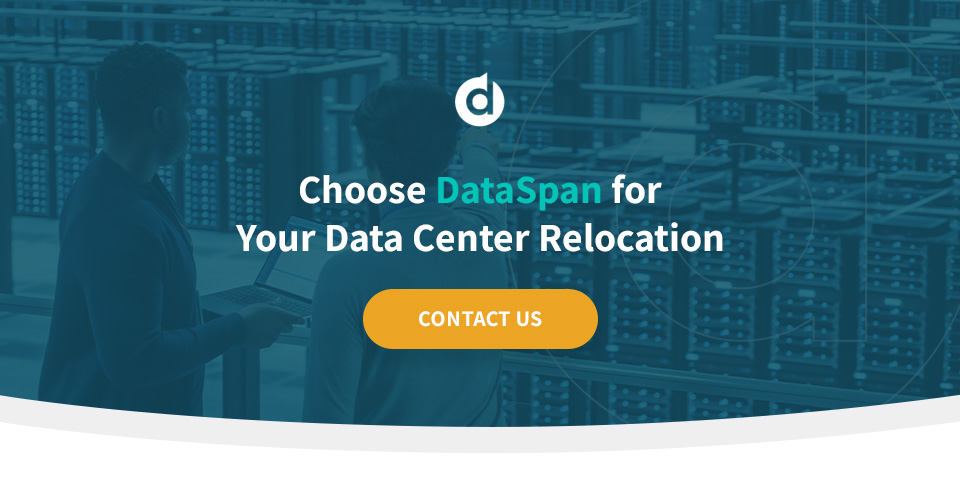
Tips For A Successful Data Center Relocation
3 Tips for a Successful Data Center Relocation
Whether you’re transporting servers between rooms or moving your company to a new state, relocating your data center is a big move. Relocation can help you reorganize your IT assets, enhance your security measures and shrink your operational expenses.
Knowing where to start with a relocation is a common obstacle for companies. Here’s our guide to making your data center relocation go smoothly.
What Is a Data Center Relocation?
A data center relocation is the process of moving your organization’s data and IT assets between sites. It can take many forms, from moving servers between floors to hauling all your equipment cross-country.
You may hear people use the terms “relocation,” “migration” and “colocation” interchangeably, though their definitions differ.
- Relocation: Physically moving data center equipment and all its digital contents from one location to another.
- Migration: The transfer of data between devices or virtual environments regardless of their physical location.
- Colocation: A data center that securely houses data, infrastructure and networking equipment from multiple clients in the same facility.
Migration and colocation are typically parts of a relocation strategy, though each move depends on your data center’s unique needs.
What Are the Advantages of Data Center Relocation?
There are many ways your business can benefit from a data center relocation.
- Cost savings: A relocation is an excellent opportunity to assess your existing infrastructure and replace or discard aging technology that costs too much to maintain.
- Increasing scalability: Moving your data center infrastructure to a new location can give you more space to add new equipment and expand your operations.
- Extending equipment life span: Assessing your needs can reveal ways to adapt infrastructure to better meet your organization’s requirements.
- Enhancing security: If your existing security strategy no longer serves your organization, you can rethink it to work with your new data center location.
Breaking Down the Relocation Process
Here’s a quick overview of what a data center relocation usually looks like.
- Planning: First, your organization will strategize and determine how you will approach your relocation. This step is vital for a smooth relocation.
- Communication: Getting buy-in from people at every level of your organization is critical for a successful data center relocation, so you should explain why this move is necessary.
- Resource allocation: Appropriately allocating resources and assigning roles is essential for ensuring everyone is always on the same page during the relocation process. Working with a third-party data center service provider can help you fill any knowledge or material gaps.
- Equipment auditing: An IT audit involves thoroughly reviewing all your existing equipment, infrastructure and processes to identify priorities and upgrade as needed.
- Testing and documentation: Once you’ve executed your relocation strategy, test your systems to ensure they work together as expected. Thoroughly document all findings, adjust as needed and make sure to maintain these records for future reference.
Note that your relocation process may include additional steps depending on your data center size and business model.
Data Center Relocation Tips for Long-Term Success

Here are three best practices you can use to ensure your relocation generates a strong return on investment:
1. Plan Early and Thoroughly
Begin planning your relocation as soon as possible. This stage should take up most of your time, as you need to account for every potential obstacle. Here are some essential considerations.
- Downtime: Often, relocating data center infrastructure requires at least a short period of workload downtime as you transfer data between systems. Plan for business continuity during this period and notify your users in advance to minimize disruption and prevent excessive losses.
- Contingency planning: You need to have a plan in place if something goes wrong during the relocation process. This plan should address all potential roadblocks and failures to cover your bases in every scenario.
- Uptime: Maximum uptime for every department is critical for a successful relocation, though IT is the only part of your organization responsible. Working with an experienced professional can help you proactively manage risks and confidently approach your relocation.
2. Choose the Right Migration Methods
Migrating data is a vital step in data center consolidation, which involves increasing your center’s overall efficiency while reducing the number of IT assets you use. Essentially, effective consolidation simplifies the relocation process and cuts overhead costs moving forward.
Here are the primary data migration techniques you might use.
- Physical to physical: Moving data between two physical storage devices
- Physical to virtual: Migrating digital assets from a physical device to a virtual machine
- Virtual to virtual: Moving digital assets between virtual machines
- Virtual to physical: Transferring data from a VM to a physical device
- Physical to cloud: Migrating data from a physical device to a cloud environment
- Virtual to cloud: Moving data from a VM to a cloud environment
A hybrid approach that combines two or more of the above is often the best solution, as it allows you to tailor your relocation strategy to fit your organization’s infrastructure.
3. Partner With a Third-Party Data Center Services Provider
Data center relocations are complex processes, and your organization needs people and resources to ensure a successful operation. Here’s how a data center services provider can help you relocate.
- Maximizing efficiency: A professional data services provider can avoid the time-consuming mistakes an inexperienced person will likely make, eliminating the need for repeat work and reducing workload downtime.
- Reducing costs: Besides reducing your overall risk and saving you valuable time during the relocation process, your data services partner can help you identify opportunities to consolidate assets and cut your operating expenses.
- Providing complete services: Your provider will work with you to understand your business’ data needs and recommend solutions and techniques that can enhance your operations beyond the relocation.
Of course, you should always choose a provider you feel confident in trusting. Look for a company with extensive industry experience and an established presence in your area, and always be sure to ask questions during the initial consultation to ensure their business aligns with yours.
Choose DataSpan for Your Data Center Relocation
A reliable third-party data center services provider can help you optimize your relocation strategy to cut costs, save time and ensure long-term success. If you’re looking for a partner with decades of knowledge and experience, DataSpan offers comprehensive data center relocation services for your business.
Our experienced team serves clients nationwide, from large metropolitan centers to quiet rural areas. Contact your local DataSpan rep today to set up a consultation.








